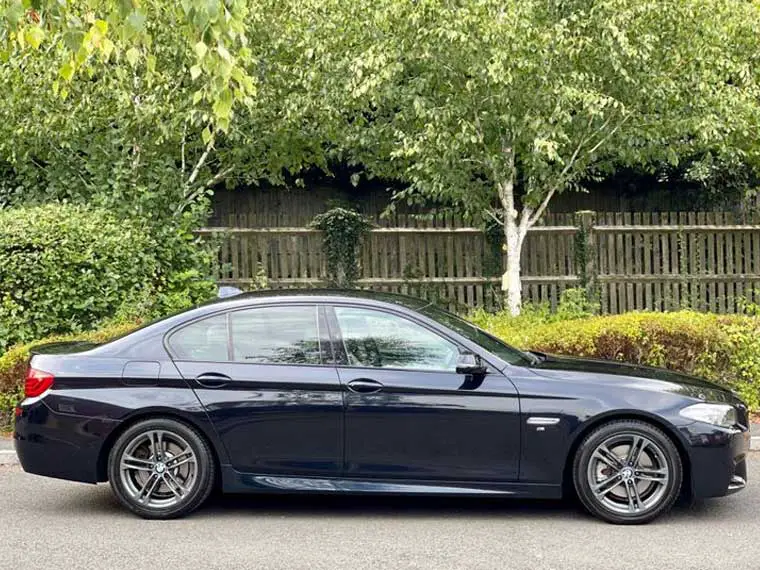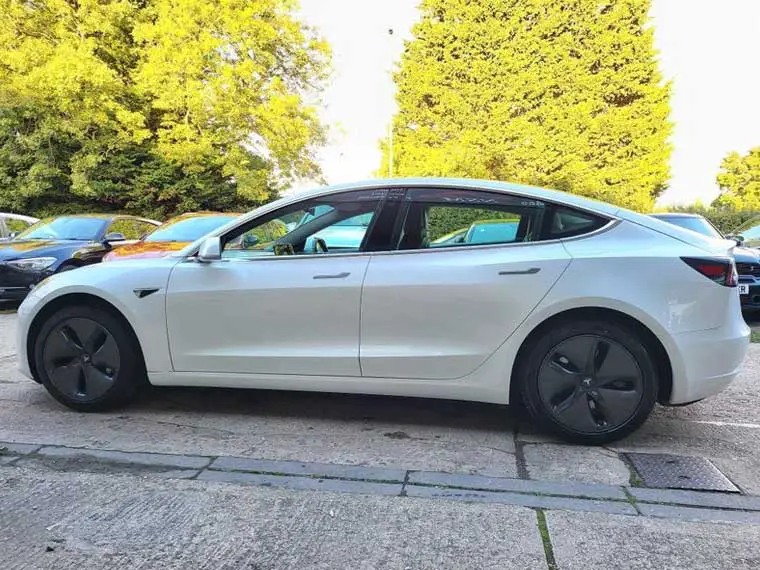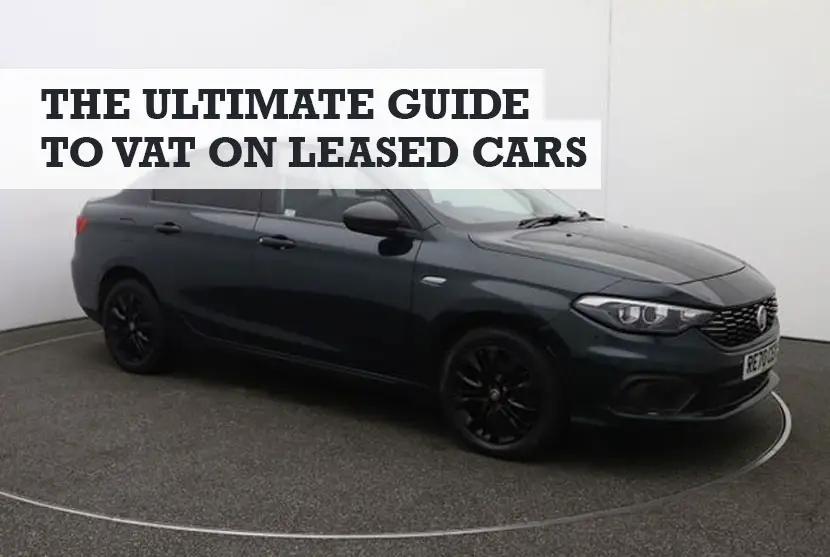The complexities of the UK tax system throw up many queries from small business owners, with the question of claiming VAT on lease cars being no different. It’s often a grey area, but we’ve put together the ultimate guide to the understanding VAT on leased cars.
Firstly though, let’s answer the most pressing question you are bound to have, which relates to whether you can you claim back VAT on car leasing.
Yes, you can claim VAT back on a car lease, but generally, you can only claim 50% of the VAT you pay on leasing a car. The 50% block is to cover the private use of the car unless you can prove no private use such as a pool car.
It’s also worth noting that if you use the car for business purposes, you can reclaim the VAT on any repairs and maintenance, if the business paid for the work.
Before we go on, we’re not going to cover whether you should consider a van or a company car in this guide. If you would like to find out more about how to reduce your personal tax bill when having a company vehicle, you can check out our guide that explains how to avoid paying tax on a company car.
But if it’s wanting to better understand whether you pay VAT on a car lease, plus how much VAT you can claim on a company car lease, this guide is for you.
Claiming VAT on a company car lease
If you lease a ‘qualifying car’* for business purposes, you cannot normally recover 50% of the VAT charged. This 50% block is to cover the private use of the car. You can reclaim the remaining 50% of the VAT charged on a company car lease, subject to the normal rules.
The 50% block applies to all the VAT on charges you pay for the rental of the car under the terms of the leasing agreement. This includes:
- Optional services: unless they’re supplied and shown separately from the leasing supply on the tax invoice.
- Excess mileage charge: if it forms part of a supply of leasing but not if it was incurred on an excess mileage charge that forms part of a separate supply of maintenance.
For leased company cars used by multiple employees and left on business premises overnight and at the weekends, you’re allowed to claim full VAT on the finance element of the lease agreement.
However, you will need to have proof that your car is in that category. Examples of this are (‘pool cars’), taxi cabs, driving school cars or self-drive hire vehicles.

If you use a vehicle for business purposes, you can reclaim VAT you were charged on repairs and maintenance as input tax – but only if the business paid for the work.
It does not matter if the vehicle is used for private motoring or if you have chosen not to reclaim VAT on road fuel.
Handy Hint: Here’s all you need to know about employers having to pay the 45p mileage rate to employees.
The 50% input tax block applies to the lease element of the contract only. The maintenance element is considered a business expense allowing you to claim 100% of the VAT back. Just make sure that the maintenance charge is listed separately on the rental invoice.
If you’re a sole proprietor or partner and use a vehicle solely for your own private motoring, you cannot reclaim the VAT on repairs to your leased car as input tax.
*A qualifying car is a car that’s not been subject to the full input tax block. This means that your business or any earlier owner has recovered the input tax on the purchase in full. Such cars will be sold on a normal tax invoice with VAT charged on the full selling price.
Can you claim VAT on an electric car lease?
Given the current news and opinion moving to more environmentally friendly modes of transport, many people mistakenly believe electric cars have different tax rules applied.
Unfortunately, this is not true, as there is no VAT benefit to leasing an electric car. Just like a standard car, electric cars have the same VAT rate of 20%.
But that doesn’t mean you cannot reclaim VAT on electric car lease. Just like other cars, it is possible, providing the claim fulfils the criteria on VAT on leased cars we’ve already outlined in this guide.

To summarise, no VAT can be recovered on the purchase of a company car if there is any private use of the car. HMRC states that VAT can be reclaimed in full on a new car provided there is no private use and strict tests need to be applied to see if you qualify.
However, where cars are leased or hired 50% of the VAT on the leasing charge can normally be reclaimed. This applies whether the car leased is electric, hybrid, petrol, or diesel.
In conclusion, a company can reclaim VAT on electric car lease to 50% of the charge.
Can I claim VAT back on a company car purchase?
But aside from paying VAT on leased cars and then claiming it back, what about the VAT on a company car you buy rather than lease?
Well, as a rule, you cannot claim back the VAT on the purchase of a company car. But if you buy, import, or buy one of the excepted cars we’ve listed below, you may claim back VAT in full.
These rules apply to a car which:
- Is a stock in trade of a motor manufacturer or dealer (read section 3.2).
- Is intended to be used primarily as a taxi, driving instruction car, or self-drive hire (read section 3.4).
- Will be used exclusively for the purposes of your business (read section 3.5) and would not be made available for the private use of anyone.
A car is used exclusively for business purposes if you use it only for business journeys and it is not available for private use. This means that you do not intend to make it available for the private use of employees or anyone else.
Handy Hint: Did you know it’s possible for a company director to have two company cars?
How can you prove that a company car is only for business use?
A car is available for private use when there’s nothing preventing you or your employee from using the car for private use. The fact that you bought your car for the purpose of your business is not the only requirement. You need to make sure that the car is not made available to anyone else.
You can prove a company car is prohibited from private use and recover the VAT incurred if it’s:
- Normally kept at the principal place of business.
- Not distributed to an individual.
- Not kept at an employee’s home.
- Get employees to sign a car use agreement.
- Keep a mileage log of all trips made in the vehicle to confirm only business use.
- Take out an insurance policy for business use only.
Whilst you may not be able to claim back the VAT on the purchase of a company car if you use a vehicle for personal use, you can reclaim the VAT you were charged on repairs and maintenance as input tax if the business paid for the work.
The VAT you incur on all other business motoring expenses (perhaps fleet management charges or parking charges) is input tax and recoverable, subject to the normal rules.
It does not matter if the vehicle is used for private motoring or if you have chosen not to reclaim VAT on road fuel.
If you’re a sole proprietor or partner and use a vehicle solely for your own private motoring, you cannot reclaim the VAT on repairs as input tax.
FAQs about VAT on leased cars
Can I claim back VAT when buying a company van?
One of the biggest advantages of buying a commercial vehicle for your business over a company car is that you can reclaim the VAT on a company van.
But, just like the rules on VAT and company cars, you must only use the vehicle for business use. Commercial vehicles such as vans tend to only have a business use.

You might be able to reclaim all the VAT on a new van or commercial vehicle if you use it only for business. You must be able to show that it is not used on a personal basis, for example, it’s specified in your employee’s contract.
On a big expense such as buying a company van being able to reclaim 20% VAT could make a significant difference to your business.
If you are considering a van as an option for your business rather than a company car reading our ‘guide to buying a van through my business’ will answer many questions such as whether you can claim for buying a van on your tax return and whether you should buy lease a van.
Can I claim VAT on a leased van?
There are no restrictions on claiming back VAT on a leased van as it is classed as a commercial vehicle so private usage is assumed to be minimal, unlike a car.
Vans and other commercial vehicles are eligible for 100% VAT recovery whether bought or leased.
Because of this, the question of whether you can claim back VAT on car leasing becomes very different when applied to a van. Perhaps your business could use a van over a car?
Do I need to pay VAT when I sell a company van?
If you sell a vehicle on which you were charged VAT when you bought it and you were entitled to recover at least part of the VAT, then you must account for output tax on the full selling price.
If you were not charged VAT (perhaps a van bought from a private individual) you may use the margin scheme for the sale of the vehicle.
Do I need to pay VAT when I sell a company car?
If you sell a car on which you recovered VAT (perhaps a driving school car or a pool car) then you must account for output tax on the full selling price. You must issue a tax invoice to a VAT-registered buyer who requests one.
Sales of these vehicles are not exempt, and they cannot be sold under the second-hand margin scheme.
If you sell a car where you were charged VAT but could not recover any of that VAT, then you do not have to charge VAT on the sale and cannot issue a tax invoice.
This is because the sale of the car will be exempt. Any input tax charged, which relates to the sale (for example VAT on auction fees) is exempt from input tax.
When you sell a car on which you were not charged VAT when you bought it (perhaps from a private individual or from a dealer who sold it under the VAT second hand margin scheme), you do not need to account for VAT on the full selling price if you sell it under the VAT margin scheme.
Under the margin scheme, you only account for VAT on the difference between your purchase price and your selling price.
Conclusion
As you can see, leasing a car does include VAT considerations. But for small business owners, this could be beneficial when it comes to claiming back VAT on leased cars – don’t forget to do it!
For most small business owner, whether you can claim VAT back on a leased company car is probably not top of your agenda when considering which vehicle, you’re getting next.
However, not knowing whether you can claim the VAT back on leased cars and vans could end up being a costly mistake.
You might be leaving sizeable chunks of cash on the table if you do not understand the difference between buying a car outright versus leasing a company car. Even whether a car is considered a qualifying car from a VAT point of view.
As you probably know, nothing is ever as simple as it seems when it comes to reclaiming VAT from HMRC (HM Revenue and Customs).
That is before you even start to factor in whether a commercial vehicle such as a van might be a better possibility altogether. If you are not that phased by having the latest swankiest car, then that might be a practical choice.
So hopefully we’ve cleared up the trivial matter of whether you can claim back VAT on lease cars and supplied some useful hints and tips on how to maximise the VAT you can claim back on your leased car.
As well as looking at the rules around VAT and leased vehicles we have supplied plenty of scope for consideration around when you may be able to claim VAT in full when buying a company car and what the differences are compared to claiming VAT on a commercial vehicle such as a van.
This should give you something to consider in terms of the type of vehicle you can have in the business, and which one makes the most sense from a VAT perspective.
VAT is not the only consideration of course but knowing whether you can claim the VAT back on a company car might be the catalyst for re-appraising your original decision and save you a chunk of money in the process.
More small business guides…
- How to avoid paying tax on a company car
- The rules on buying a second-hand vehicle as your company car

Jon has been in business since 1999, and in that time worked with more than 300 small business clients. As well as being an accountant, he is also an early adopter of tech, and has helped small businesses to leverage the power of their computer systems by creating software to automate and simplify accounting tasks.






